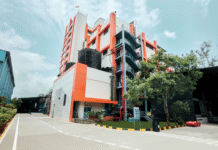The ongoing Covid-19 pandemic has been a huge tailwind for the Indian flexible packaging industry. In the coming years, the growth rate will be much higher as the demand for packaged goods rises, Biku Kohli, managing director of SP Ultraflex, told Packaging South Asia.
“I see the Covid-19 pandemic as a catalyst for the growth of the Indian packaging industry. This unfortunate event has the potential to change the growth rate of the flexible packaging for the foreseeable future,” Kohli said. “If we were growing at a certain average rate annually, I see that growth rate to be higher by 7-10% in the years ahead. India always had the potential, and the Covid situation will only help in accelerating the realization of that potential.”
Mumbai-based SP Ultraflex is a leading manufacturer of slitter rewinders and has supplied more than 15 machines during the pandemic to flexible packaging converters in India and overseas. What’s more, a majority of these are models from its’ top-rated ROBOSLIT series dual turret slitter rewinders.
A rush of orders from a variety of customers
There was a huge demand for packaged food and FMCG products during the lockdown, and the consumer preference for packaged goods continues in the un-lockdown. The need for packaged goods meant that demand for flexible packaging printing and converting machinery too was strong. And this has benefited SP Ultraflex as well, which has seen an excellent order book in recent months.

“We see convertors place several orders, and this trend is across categories. Not only blue-chip companies but small family-owned businesses have stuck their necks out and are investing in newer machines, and machines with more automation,” Kohli said. “This trend of convertors going for machines with greater automation is a big plus for SP Ultraflex because we are known for producing such machines.”
Talking about the company’s performance during the 2020-2021 financial year, Kohli said that for SP Ultraflex, the year would be much better than expected. “We have seen very robust orders from new and existing customers. Frankly, we have never seen such buoyancy before, and it’s great to see the entire team making the most of the opportunity that has presented itself.” he said.
Digital business, remote installation & Google glass
The lockdown, imposed in end-March, led companies to look for new ways of doing business and interact with customers. Adoption of digital technology was quick and widespread among Indian companies. Although its factory was shut from around 10 March to 20 May, SP Ultraflex quickly incorporated digital communication technology for internal and external work.

“Working during the early part of lockdown was a challenge. But we never stopped talking to our customers, and the digital medium played a big role. The recent months have been a period of great learning. We could never have imagined that we could commission a machine virtually, that too a medium automation level slitting machine,” Kohli said.
SP Ultraflex has been using Google’s Glass technology for new installations and service interventions. Having used Google Glass to guide its customers, as if its engineers were at the actual site, Kohli says this trend is here to stay.
Digital business means real-time workflow and response
“We have realized the tremendous potential that the digital medium has. For example, when we are talking to a potential customer, we can have sales, design, and automation teams taking part wherever they may be. Because of this, the customer gets all his questions answered in a responsible and actionable way. It helps us in saving a lot of time and eliminates follow up processes. We have been able to close many deals much faster due to this type of communication compared to how we sold before. SP Ultraflex will continue to incorporate digital communication technology and has built up a technology conference hub,” Kohli said.











